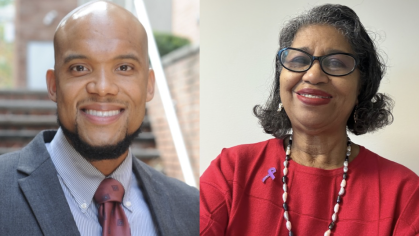February is Black History Month. Thomas Benjamin, Research Project Assistant at Rutgers School of Social Work's Center for Research on Ending Violence, spoke with Dr. Stephenie Howard, Assistant Professor of Social Work at Norfolk State University (a historically Black university), about the Black Perspective and its use in clinical social work.
Dr. Howard is also a Licensed Clinical Social Worker and President of Communities in Power, a non-profit wellness organization that provides culturally responsive services with a commitment to empowering Black communities.
Full Transcript
Hi, Dr. Stephenie Howard. My name is Thomas Benjamin. I’m a project assistant at the Center for Research on Ending Violence at Rutgers University’s School of Social Work. Could you please introduce yourself and share a little bit about how you became a social worker?
I’m currently an assistant professor with the School of Social Work at Norfolk State University. I got my doctoral degree from Howard University. My interests in social work—I am clinically trained, meaning I have my clinical license, but I’m also interested in working more so in the community. So, I have a non-profit that I started; I’m the president of a non-profit, which more so focuses on working in the community doing community outreach and development, kind of bringing the community together to learn and to grow as a community. When I actually was introduced to social work was in high school. My guidance counselor, I told her I wanted to help people. Literally, that’s what I said I wanted to do was help people, and she said that social work was a great field for that. So, I went to my undergraduate program and studied social work, and I didn’t know what exactly I wanted to do. I just knew I really liked social work—just, like, the material that we studied and the different perspectives. It really resonated with me. But I couldn’t see myself in the field. So, I went to my master’s and got my master’s degree in social work, and I still could not find myself in the field. In the meantime, I kind of hopped around in different positions in the field. But I was never really satisfied. And, so, I got my master’s degree, and I was working in the field, and, you know, I realized, listen, I love teaching. So, I’m going to become a teacher in social work.” And, so, I decided—you know, you have to get your doctoral degree. So, I applied to a school, and they rejected me. They said, “You have no research interests.” And I was like, “Well, that’s true because I don’t know what research is.” So, I went and started working for a clinic, getting some experience with a research project, and I fell in love with research. And, so, then I went to Howard University, and I learned about the Black Perspective, and it was really transformative. It really transformed my whole understanding of social work itself. And, so, now here I am. That’s my story.
And where did you say you attended undergrad?
I went to VCU—Virginia Commonwealth University. And then I came back. I actually went to Norfolk State University for graduate school. So, I kind of bounced around a little.
So, you mentioned the Black Perspective, and could you briefly explain what it is and why it’s useful in clinical social work?
Sure, absolutely. The Black Perspective is the pedagogy for Howard University’s School of Social Work. So, it’s their way of teaching what social work is and how students should practice in the field. It’s an emphasis on the specific needs of Black communities with also being responsive to other oppressed and marginalized communities. And, so, they teach you about the needs of communities that have historically experienced oppression and how we need to really be sensitive to those specific needs. It seems like social work should do that naturally, but, unfortunately, what we see in social work is that there is more of a perspective on the needs of individuals who are suffering but from a more individualistic perspective and not really focusing on the broader community and the collective shared traumas and history and how we can address that. And, so, the Black Perspective does a really good job of orienting you to the history of marginalization and oppression and how it fundamentally changes communities and how we can be really responsive to the specific experience of oppression. So, Howard does a really good job of training you to do that. I was trained from the Black Perspective at Howard University though there are other Black perspectives.
Before you entered Howard University, were you at all aware of the Black Perspective, and, if not, were you aware of any other African centered or Black centered philosophical lenses?
I was not. I was not. Unfortunately, in major texts there is a gap in terms of Black social workers and what they’ve contributed to the field. I do have an article that talks about historical Black social workers and how their perspective was very different from the majority field. And, so, they did more emphasize community work while the majority emphasized more individual work and clinical.
So, how does using the Black Perspective help a clinician establish something like therapeutic alliance?
Oh, that’s a great question. Whether you are a person of color or not, you know, race is the elephant in the room. And the Black Perspective really does encourage you to be bold in terms of addressing race and to be sensitive and mindful that it is—it can be—an emotional topic. But it does encourage you and help you to develop the comfort in talking about racial issues. You know, really being direct and addressing it head-on is what comes out the Black Perspective. And that helps to open the door for clients to talk about, race, racial issues or issues that are closely related to race. It helps them to feel like more of their humanity is present. They tend to feel more closeness. Actually, I wrote another article about—so, I was really interested in knowing what Black clients—what their feeling is about race and therapy. So, I did a search of tweets. I looked at specifically people who were talking about the racial identity of their therapist and kind of assessed what that meant to them. And, so, I came up with these different themes. And one of the themes was that it did make them feel closer when their therapist was able to say, “Listen,”—was able to understand the racial factors. And it was addressed directly, and they felt comfortable having discussions about race-related issues. So, it makes you feel more human and more familiar and more intimate when race is addressed, when you have a Black perspective that really is direct in confronting the matter of race.
So, there are six established principles of the Black Perspective—one being affirmation, second, strengths, third, diversity, fourth, vivification, fifth, social justice and, sixth, internationalization. Which of these principles, if any, seem to best reflect the objectives of an observance period such as Black History Month?
Oh, interesting. One that jumps out at me is vivification—bringing life to the history and the culture and experience of being Black in America. I think that’s what Black History Month is designed to do. We’ve experienced so much hardship as a community, as a collective, but Black History Month, to me, really does mean celebrating our lives and our history and our strength and resilience. And, so, I think certainly that speaks to the principle of vivification.
On its surface, the Black Perspective may appear to be a philosophical lens intended for application to Black clients. Could you share how this social justice practice approach is beneficial to identities outside of Black racial identity?
Sure, so, certainly marginalized communities, communities that have experienced oppression could benefit from this perspective. So, minority communities, religious minorities, LGBT communities. But, also even looking at being intentional in addressing race also means helping White communities, White people who identify as White, to recognize how they’ve been impacted by race—I mean racial injustice. Because it doesn’t just impact Black people. I’m not saying that it impacts everyone the same; that’s not true at all. But, White people have been negatively impacted by [anti-Black] racial oppression. There’s a author—I forget his name—but his book is “My Grandmother’s Hands.” It’s more of a therapeutic book addressing racial trauma. And it does talk about the racial trauma that White communities have experienced. And he describes a child, a White child, witnessing the lynching of a Black man. And that’s traumatic for a child. We know that if you identify with the victim, you may have more negative changes, a stronger trauma reaction, but it’s still traumatic to watch some violence like that and to really have no understanding--not that there isn’t understanding for senseless violence like that. But we’ve all experienced trauma as a result of this system. And, so, working with people to address that trauma, it can be valuable for very many different populations.
So, in your 2018 paper, published in the Clinical Social Work Journal, a paper entitled “The Black Perspective in Clinical Social Work,” you did go into detail on a particular case in which, of course, a pseudonym is used, you talked about a client named Sally. Sally, if I remember correctly, was a middle-aged White woman who initially you encountered displaying anxiety from domestic violence. Could you talk about how the Black Perspective helped her in her demonstrating ethnic and racial social bias?
Sure. So, Sally was interested in working through some of her bias, and she recognized that it was impacting relationships with her family. It was nearing her network, her social network. And, so, she actually spoke with other people about the work we were doing together. It was something that—and I think that’s important to note that this is not something I projected on her or that I forced upon her. She was interested in undertaking this work because she saw that it wasn’t helpful. I believe that, you know, through it she was able to be really kind of starting the process of becoming liberated from that bias. Having a bias against someone takes a toll on you. There’s anxiety, there’s distress, there’s discomfort. And being able to step out of that can be very rewarding—personally rewarding. And she also was able to open up her network, and she started to have more diverse interactions with people, and they were comfortable interactions. She also was able to grow her network. And the experience of domestic violence is often a very isolating experience. People find that they lose friends and family. And, so, to be able to grow your social network is really important when you are experiencing domestic violence. And, so, it was very beneficial for her to be able to connect with other people and to have more diversity in her network.
Also in your paper, you had noted three clinical cases in which you used the Black Perspective, and that they demonstrated outcomes such as appreciation and integration of client’s worldview, empowerment of the client to make positive changes, solidarity with the client and decreased social bias-related distress. After continued use of the Black Perspective, what outcomes would you anticipate for, say, a clinician? Do you see any benefits in using the Black Perspective for the clinician after continued use? Or maybe you have experienced some yourself.
Personally, as a Black person working with—in particular working with minorities—and using this perspective, a lot of clients who identify as Black, they want to work with someone who understands their perspective. They come in and express a lot of gratitude. And just to be able to come and have a safe space and to feel their concerns, their values, their experiences—to have them normalized—is rewarding to be able to support people in such a unique way. Because not a lot of clinicians can do that. Even clinicians of color may not be able to hold space—for other—for Black clients to be able to feel themselves and to feel validated and affirmed. So, that’s really rewarding to be able to do that. As we’re talking about many of the concerns and the issues that we discuss are very familiar. And, so, it can be kind of—I don’t want to say therapeutic—but it can—I guess it does affirm my own position and to hear other people experiencing similar concerns and having similar thoughts and reactions. But, I would also say that just being able to use the Black Perspective and address race directly, it helps you to be able to be comfortable with non-White clients. And that’s always great to feel comfortable and to be able to be your authentic self in those settings. If we’re not addressing them, there’s kind of this conflict. And you can feel that conflict, and you can feel the tension. And, so, I think it helps the therapeutic relationship because it deflects some of that tension. It helps you really come together on a shared understanding and appreciation for who the person is. There’s that color-blind philosophy where people think that we should ignore race, or we should ignore cultural differences. But that minimizes the whole person. And, so, being able to have this perspective and to confront, you know, these parts of people, it helps them to feel more human, to feel more understood and affirmed and validated. So, I think it’s helpful as a clinician, too. I think there’s a lot of value to it as a clinician.
Have you ever talked to a non-Black social worker about their experience using the Black Perspective?
I haven’t so much talked to someone about using the Black Perspective. I talked to non-Black clinicians about using the Black Perspective, but I’d never talked to someone, a non-Black clinician, who uses the Black Perspective. The closest is I had a colleague who identifies as a feminist and uses the feminist perspective. And they’re very closely aligned. And, so, we wrote an article together, actually because we share very similar philosophies, so we were able to collaborate on an article about using a social justice perspective in the field. It’s very similar.
If a social work student wants to use the Black Perspective, whether it be in clinical practice or in their undergraduate or graduate studies, but the Black Perspective is just not part of their social work program curriculum, what can they do?
It’s always recommended that you supplement your studies with Black studies or readings from minority scholars. That’s just a good practice in general. So, you have your main textbooks, and then you supplement with some other readings from different perspectives. So, that can be helpful. But I would also try to connect with some scholars or practitioners who share that perspective. I believe in mentorship. And, so, having a good mentor—I mean, you should have many different mentors and particularly when you’re working in the fields—but, I think, you know, a mentor who is familiar can help you to grow in that area. I would also recommend engaging in the culture. So, we as social workers, we believe in continuous learning. And, so, we’re always learning as an expectation regardless of what level of practice you are in. I believe that an area where we should always be learning is in terms of culture. And we should be intentional in engaging in different cultures. And, so, I think that’s also just making a point of engaging on a regular basis with Black communities and Black culture or other cultures and communities that we serve that can also help to inform us so that we can be more culturally aware and sensitive to the needs of the communities we’re serving.
This story was created in partnership with Rutgers School of Social Work's Inclusion, Intersectionality, Diversity, Equity, and Advancement (IIDEA) Committee in support of our commitment to diversity, equity, and inclusion.



